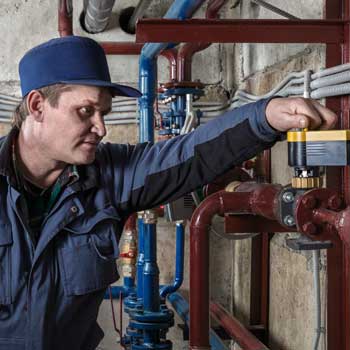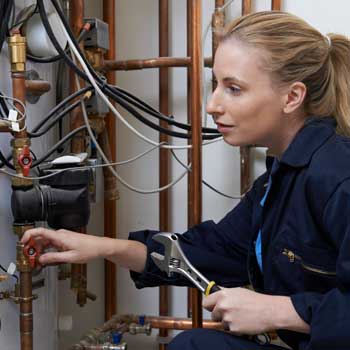When you close your eyes and imagine a plumber, what do you see?
Today’s modern plumber doesn’t match up with the clichéd persona that you may envision.
Perhaps more than any other career, plumbers get a bad rap. That stereotypical image of a plumber has been revisited countless times in cartoons, TV shows and movies. While the gag may seem harmless, it’s misleading and paints the plumbing craft poorly.
The jokes don’t do justice to the skill, training and hard work that goes into being a plumber.
A career in plumbing is much more than it’s cracked up to be. Here are four things plumbers want you to know about their profession.

One of the top stereotypes surrounding plumbers — and all types of craft professionals — is that they’re uneducated and this is the only type of job they could find.
While it’s true that plumbers generally don’t need bachelor’s degrees, it’s wrong to say they aren’t educated. First, most plumbing programs require a high school degree or equivalent to get started. So thinking this is a field full of dropouts is incorrect.
Beyond high school, plumbers undergo a lot of job-specific training and education. This education can have many forms, from apprenticeships with experienced professionals to postsecondary technical school or craft training programs. Successful completion of these programs often results in the plumbing student earning industry-recognized credentials that indicate their skill and knowledge.
Most states also require a plumber to pass an exam and get a license in order to practice.
Education extends far beyond the boundaries of the traditional four-year university degree. Plumbers will undergo several years of learning both on the job and in the classroom before reaching journeyman level.
Most people only think of plumbers that come to fix a leaky faucet or unclog a shower drain or a backed-up toilet.
While home repairs and maintenance are an important aspect of what plumbers do, their work extends far beyond the crawlspace beneath your kitchen sink.
Plumbers are the ones that design and install the water systems in your house in the first place. When a house or an office, school, hospital or factory is being built, plumbers are right there alongside the engineers, carpenters, masons, electricians and other craft professionals on site.
The complex piping that brings clean hot or cold water into a building while removing waste needs to mesh and coordinate with all the other systems as well as the existing infrastructure such as a city’s main lines.
The next time you think about plumbers, remember that they do so much more than using a plunger on a toilet bowl. There are pipes ferrying water to and from your building hidden behind the walls and beneath the floors, and it’s all thanks to plumbers.
As we mentioned, plumbing systems are very complex and need to work together with all the other systems in a building.
Do you really think somebody without skills could pull that off?
It takes a lot of talent, skill and knowledge to be a plumber.
Plumbers need to be good at math and understand physics. Factoring in gravity, temperature and water pressure into plumbing systems requires quite a lot of calculations.
Plumbers also need to be good at reading blueprints, schematics and diagrams in order to integrate their systems into the bigger picture of the construction project. Local ordinances and sanitation standards must also be understood and followed to a T.
Along with the more mental things, plumbers need to be good with their hands in order to complete actual installations in repairs. Did you know that many plumbers also weld and solder? Using tools correctly and safely are critical hard skills for plumbing.
Not just anyone can do what a plumber does. It takes years of training and practice in order to become a great plumber.

Plumbing might not seem like a glorious job.
It’s true that sometimes it can be hard, sweaty work. Sometimes it can be smelly and gross.
But ask any plumber and they’re likely to tell you that they love their job!
Surveys rank construction professionals as happier than those in any other industry. Across all craft careers, including plumbing, there are high rates of satisfaction. Craftspeople love being able to work on incredible projects that leave a great impact on their community.
Some plumbers get to be involved in building iconic structures that will stand for generations. Others get to head home after work every day knowing that they helped families and households fix a problem in their lives.
And of course, there are some great financial benefits to being a plumber as well.
According to the NCCER 2018 Craft Salary Survey, plumbers earn an average base salary of nearly $60,000 per year, and additional benefits such as travel and overtime compensation can push earnings much higher.
There’s good money to be made in construction, and the growing demand for craft professionals continues to raise wages.
Becoming a plumber also doesn’t put young adults into a big financial hole like getting a college degree does. With the total student debt in the U.S. surging past $1.5 trillion, a high-paying and high-demand career that doesn’t require a degree is a welcome option for young people.
Plumbers are a valuable and important part of any community.
Without them, we wouldn’t have easy access to clean drinking water. We wouldn’t have showers or flushing toilets or laundry machines or central cooling and heating systems.
Despite the importance of these pipe-laying professionals, there is a growing shortage of plumbers. With a high demand for skilled plumbers, now is the perfect time to jump into this lucrative career.
Discover more about how to map out a career in the crafts.